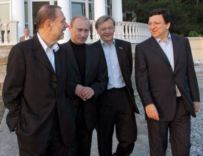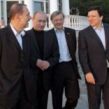
Sochi Olympics Provide the West with Leverage in Dealings with Russia
Publication: North Caucasus Weekly Volume: 13 Issue: 19
By:

On September 23, Circassian activists staged worldwide public protests in support of Syria’s Circassians. Activists took to the streets in several Turkish cities, in Germany and in the United States. In the North Caucasus, protests were held in Nalchik, Kabardino-Balkaria, and Maikop, Adygea. In Moscow and Sukhumi, Abkhazia, protest actions were held jointly by Circassian and Abkhaz activists (https://www.ekhokavkaza.com/content/article/24718732.html). The activists demanded that Moscow assist Syrian Circassians who have been caught up in Syria’s civil conflict by repatriating them to the North Caucasus. The Circassians originally ended up in Syria following the Russian conquest of the North Caucasus in the 19th century. The Russian government killed and expelled an estimated 90 percent of the Circassians from the North Caucasus as it wanted to effectively Russify the strategically important Black Sea coast that the Circassians had had the misfortune to inhabit. An estimated 100,000 ethnic Circassians currently reside in Syria. Multiple appeals by the Syrian Circassians and other Circassian activist groups to official Moscow have had little effect so far.
The Russian government apparently regards the massive repatriation of Circassians to the North Caucasus as a security hazard. However, by not helping the Syrian Circassians, Moscow is antagonizing the Circassians who live in the North Caucasus. Alienating the North Caucasian Circassians is not a trivial question for Moscow, since they live close to the site of the 2014 Winter Olympics in Sochi. The Circassians are now more likely to protest against the Olympics that are being held on the territory the Russian Empire “ethnically cleansed” of Circassians.
The headline of a recent report on the Circassian protest action in Moscow in the Russian newspaper Moskovsky Komsomolets probably reflects the general Russian attitude toward the Syrian Circassian issue. It was entitled “Circassian activists came out to support their compatriots in Syria” (https://tv.mk.ru/video/3884-mk-tv-cherkesskie-aktivistyi-vyishli-podderzhat-svoih-sootechestvennikov-v-sirii.html#). Thus in Russia, the Circassians and their ethnic kin are regarded as “others,” not really Russian citizens. Consequently, Circassians should deal with “their” problem as they wish, but Russians do not want to get involved in helping them. This attitude persists despite the existence of a Russian law on an assistance program for compatriots who would like to move back to Russia. While the country is admittedly under-populated and is in need of a workforce, the government is hostile to the idea of repatriating ethnic non-Russians, who may lay claims to the land. This glaringly selective approach of the Russian government to emigration issues is bound to affect adversely the attitudes of the Circassians and other non-Russians toward Moscow.
Thus far fewer than 1,000 Syrian Circassians have moved back to the North Caucasus. Legally, they are not even regarded as refugees; rather, they are treated as a guest workforce. Every year Moscow designates quotas for importing foreign workers for each Russian region. Having made use of this rule, the republican governments and businesses in Adygea and Kabardino-Balkaria financed the relocation of hundreds of Circassians. However, the 2012 quotas for Adygea and Kabardino-Balkaria have been quickly met. Most of the financial support for the Circassian refugees reportedly came from the head of Kabardino-Balkaria, Arsen Kanokov (https://www.ekhokavkaza.com/content/article/24718732.html).
The North Caucasian Circassian activists’ high degree of dependence on the local government was demonstrated on September 23. The authorities did not allow a protest in Nalchik, Kabardino-Balkaria, to take place under the pretext that a counterterrorist operation regime had been lifted in the city only several days earlier. Similarly, the republican authorities in Adygea declined to permit a mass protest in Maikop. Instead of mass protests, the activists organized pickets (https://www.kavkaz-uzel.ru/articles/213007/).
It appears that the Circassian activists hold relatively little sway with the public unless the republican governments back them. Government backing, however, comes with a price. On September 20, several key figures in Adyge Khase, the Circassian parliamentary organization in Adygea, resigned from their positions in protest. Their action was the result of a decision by the leadership of the organization not to participate in the worldwide Circassians actions in support of the Syrian Circassians on September 23 (https://www.natpress.ru/index.php?newsid=7814). While the republican authorities evidently put pressure on the Circassian activists in Adygea and Kabardino-Balkaria to abstain from mass protests, it is highly likely that the republican governments themselves came under pressure from Moscow.
While indirectly suppressing public activism among the Circassian activists in the North Caucasus in preparation for the Olympics in Sochi, the Russian government is also making some modest overtures toward the Circassians. On September 19, Alexander Tkachyov, the governor of Krasnodar region, where the Olympics will be held, met Circassians in Sochi and promised continued financial support for Circassian culture in the region. There are over 25,000 ethnic Circassians in Krasnodar region, which has a population of over 5 million people (https://www.livekuban.ru/node/484482).
On September 28-29, the Third Caucasian Games took place in Nalchik, Kabardino-Balkaria, involving 1,500 participants from the North Caucasian Federal District. Moscow’s envoy to the North Caucasus, Alexander Khloponin, artlessly gave away the purpose for holding these games, calling them “a tribute to tradition” meant to demonstrate to the world that the Caucasus is united and at one with Russia (https://www.kavkaz-uzel.ru/articles/213361/). It was clear that the games were held for purely propaganda purposes and were apparently tailored specifically to blunt Circassian criticism of the Sochi Olympics.
In the meantime, former US ambassador to NATO Kurt Volker has warned in an op-ed in the Washington Post that the West should make use of the Sochi Olympics to pressure Russia to abide by international law. The Olympics in Sochi, according to Ambassador Volker, provide an opportunity for the West to push Russia on its military presence in Abkhazia and South Ossetia, as well as on human rights questions in Russia. (https://www.washingtonpost.com/wpdyn/content/article/2010/05/21/AR2010052102233.html).
While Moscow may be successful in ignoring the demands of Circassians or of the West, when it comes to the Sochi Olympics, an international boycott of the Games would be very painful for Moscow and for Vladimir Putin personally. The Olympics provide an opportunity to engage Russia on important political issues in the Caucasus, including the North Caucasus, where a low scale war and rampant human rights abuses have been evident for several years.




